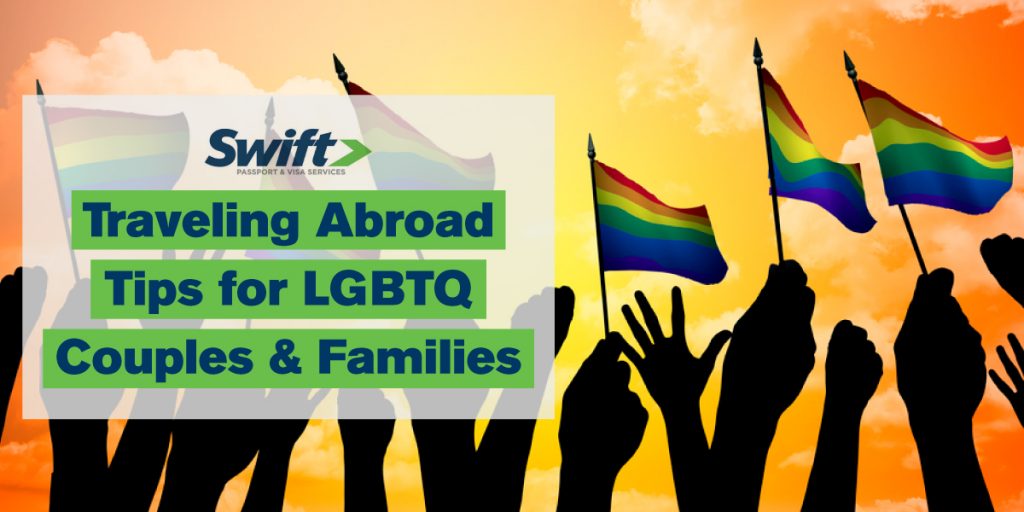
For the lesbian, gay, bisexual, transgender, and queer (LGBTQ) community, taking a trip overseas comes with an extra set of challenges. According to the Community Marketing & Insights’ 2018 LGBTQ Tourism & Hospitality Survey, international travelers listed safety and local anti-LGBTQ laws as top concerns—and with good reason.
LGBTQ rights and tolerance levels vary dramatically around the world. Even in places where homosexuality is legal, travelers may face harassment and discrimination. Can you feel safe while holding hands with your partner or spouse out in public? Will some stops on your itinerary require you to pass as straight? If you bring your kids, will your parental rights be scrutinized or rejected?
These questions shouldn’t keep you from traveling to other countries, but they should prompt some careful planning. Here’s what to keep in mind when preparing for your next international trip:
Do Your Research
According to the International Lesbian, Gay, Bisexual, Trans and Intersex Association, 71 nation states (more than a third of the world!) consider homosexuality illegal. In 11 of those, certain same-sex activities can even be punishable by death. It’s crucial to carefully vet your destination to keep you and your loved ones safe.
Start with the U.S. Department of State’s Bureau of Consular Affairs. Its website provides every country’s safety and security information, a handy Traveler’s Checklist, and current travel advisory and alerts. Plus, you can sign up for the State Department’s free Smart Traveler Enrollment Program to automatically receive security updates from your destination’s nearest U.S. embassy or consulate.
Take special note of countries and areas to avoid. Based on existing laws and recent incidents, some of the most dangerous destinations include Nigeria, Uganda, Russia, Honduras, Jamaica, Egypt, Saudi Arabia, and Iran. Even in LGBTQ- friendly regions, there can be geographical pockets or neighborhoods that aren’t as welcoming. Consider the potential risks, as well as your personal ethics, before you decide where to go.
There are plenty of online resources that can help. Check out the International LGBTQ+ Travel Association; publications like Out Traveler and GayTravel.com; gay-friendly accommodation sites like World Rainbow Hotels and misterb&b; and crowd-sourced platforms like Equaldex.

Pack Your Paperwork
It’s common for LGBTQ individuals to deal with nosey or assumptive questioning. However, when it’s at airport security, border crossings, hotel check-ins, or an emergency room abroad, it’s important to have any relevant documentation as proof. Transgender and newly wed travelers should update their passports (Swift can help with that) before leaving so that their name, photo, and sex marker corresponds to their current identity.
The truth is that you never know what might happen, especially if you’re a same-sex parent. Certain precautions can help. If possible, give your children a dual last name and make sure both you and your partner carry copies of ID, children’s passports, and birth certificates at all times.
Especially if don’t share the same last name, make sure to also bring copies of the following:
- Parentage, adoption, or custody papers
- A notarized “permission to travel” letter, signed by both legal guardians
- Child Care Authorization for Medical Care or Power of Attorney for Child documents
- Travel insurance cards with your children’s names
- A living will for you and your spouse or partner
- Emergency contact information for your family and lawyer in the U.S.
Remember These Tips
No matter where you go, you and your family are subject to the local laws and judicial processes. Keep in mind this means you won’t have the same legal protections as you do in the U.S. For example, as of January 2019, only 26 countries in the world legally recognize same-sex marriages, while a few others accept only foreign same-sex marriages to varying degrees. This can impact several steps of your trip, from applying for visas as individuals instead of as a couple to reserving a hotel room with two beds instead of one.
Always be aware of the culture and political climate you’re entering into. You’re entire family needs to exercise caution and avoid questionable situations, like potential entrapment when interacting with locals. In some countries, police monitor websites, social apps, and popular meetup spots for LGBTQ-related activity.
If you run into legal issues, experience harassment, or are arrested while abroad, immediately notify the nearest U.S. embassy or consulate. Officers in the American Citizens Services Section can be the safest source for assistance, especially if you feel the local police are unapproachable.

